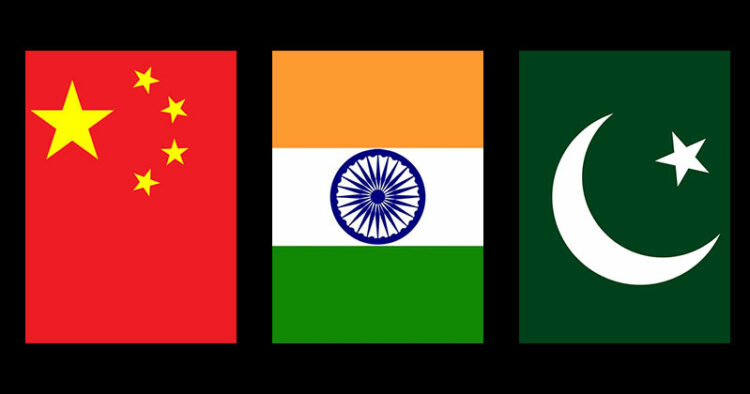As New Delhi is setting the stage for great power meetings this year, its neighbours seem to be desperate to roll out a thaw plan with India. Recently, Pakistan wished to normalise relations with New Delhi however, later turned back. On the other hand, China after failing to lock India in protracted conflict at the flashpoints of LAC is also keeping a close watch on New Delhi. Though, China is still far from the normalisation phenomena, but its possibility cannot be denied because Bejjing’s options to play against India’s best interests is gradually shrinking.
Strategic Desperation and Détente
Islamabad’s attempt to bring thaw in Indo-Pak relations is indicative of the fact that Islamabad is desperate to get out from deteriorating situation at home. However, what is more interesting to discuss that what triggered this desperation- In international politics, two hostile nations begin to normalize the relations when one of them realize the exponentially growing asymmetries between them or to control the escalation ladder of the conflict which may severely affect one of them. There are clinching evidences available-Cold war days(Soviets and Americans) and Israel growing superiority in middle eastern region. These events have led to normalisation phenomena between hostile nations. In case of India and Pakistan, normalization or détente occurred with many ups in down regardless of them being covert or overt.
We saw the modern day détente in India-Pakistan relations two years back in 2021 when both the nations negotiated ceasefire at LoC and held talks over Indus river took place. These overt affairs were time to time got complemented by covert affairs or back channel talks between two nations. Nothing significant materialised in the talks at covert and overt domains except negotiation on ceasefire at LoC. At that time India’s Vaccine Matri initiative was under rolling out and gradually reached to peak. While Pakistan was ravaging from political and socio-economic instability.
This evidences that whenever there is exponential rise of India and its strategic significance increases, alarm at Islamabad gets on and to certain extent play a major role in pushing Islamabad towards negotiation tables. Similarly, the present case could be decoded, Islamabad has once again got the ‘push’ towards negotiation tables by adverse situations however this time the situation is more harsh and worse than the past. The turning back of Islamabad is also quite comprehendible, elections in Pakistan is around the corner, political and domestic necessities to a certain extent does not allow Pakistan Prime Minister Shebaz Shariff to fully lean on the détente factor. This became a bigger necessity when Pakistan PM has to face multitude of crises and a still strong political opponent- Imran Khan. Though, one can argue about the American factor in India-Pak relations especially when it comes to Afghanistan. It is quite clear that US cannot afford to have friction with India at this stage where India is set to become power focus of the great powers this year. Even if Afghanistan comes into play in the US-India-Pak axis, Americans will be careful and calculative. As far as the question of China is concerned, the normalisation phenomena in India-China affairs also quite interesting, where on one hand, Pakistan’s so called normalisation efforts are guided by necessities, China’s normalisation efforts are guided by deception and mood testing.
During Vajpayee time, when India’s GDP cruised around 8 per cent, Chinese to certain extent wished to progressively work on normalisation of ties. Back in 2022, Chinese Foreign Minister came to Delhi after sensing Russia-India axis is getting closer and accelerating on economic issues after west bombarded Russia with stringent economic sanctions. The normalisation tactics was quite deceptive because soon China begun to flex its muscles at LAC and attempted to lock in India in protracted border conflict inspired by Mao’s strategic calculations. After deceptively dictating normalisation process with New Delhi which was clearly evident from recent clash at Arunachal Pradesh, China is now closely watching New Delhi’s geopolitical behavior as India is set to become center of power gravity this year complemented by upping the its nuclear tempo and cultivating deep US-India ties in strategic and military domains. As New Delhi’s strategic value gets boost day by day and China’s belligerent attempts are failing, China has no option but to think on normalisation phenomena yet again at least for time being.
New Delhi Extends Invitation
New Delhi’s geopolitical behavior was themed on strategic autonomy- aggressively assertive on echoing and negotiating its interests. At the same time undertaking the role of ‘Vasudhaiva Kutumbakam’ as its central approach on G-20. Undoubtedly, India has immense potential to change and refine the currents of global politics since past few years, India has proved it by its exponentially growing Atam Nirbhar Bharat Mission and continued efforts of recalibrating economics, upping the tempo of technology and development. As a power focus now, New Delhi’s geopolitical behavior has to be more sophisticated and cautioned where New Delhi cannot afford any kind of animosity or disturbances at its periphery. Inviting its arch rivals China and Pakistan for SCO Summit in Goa this year is one evidence of such behavior to a certain extent it does drop the hint of normalisation phenomena but time will only tell how much success it was.
(The writer is a national security analyst specialising in Intelligence and security analysis and worked as Research Assitant in India’s premier and prestigious national security and foreign policy think tank United Service Institution of India. He has extensively written on matters of security and strategic affairs for various institutions, journals, and newspapers. Currently, he is a guest contributor to the JNU School of International Studies. He has also served as Defence Editor for a journal)




















Comments